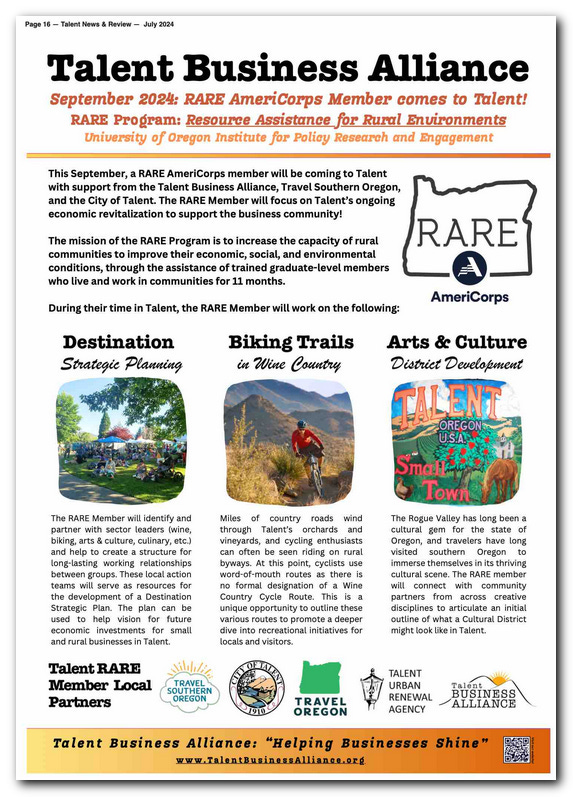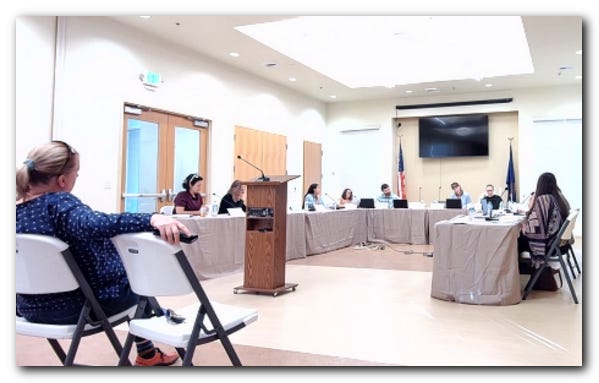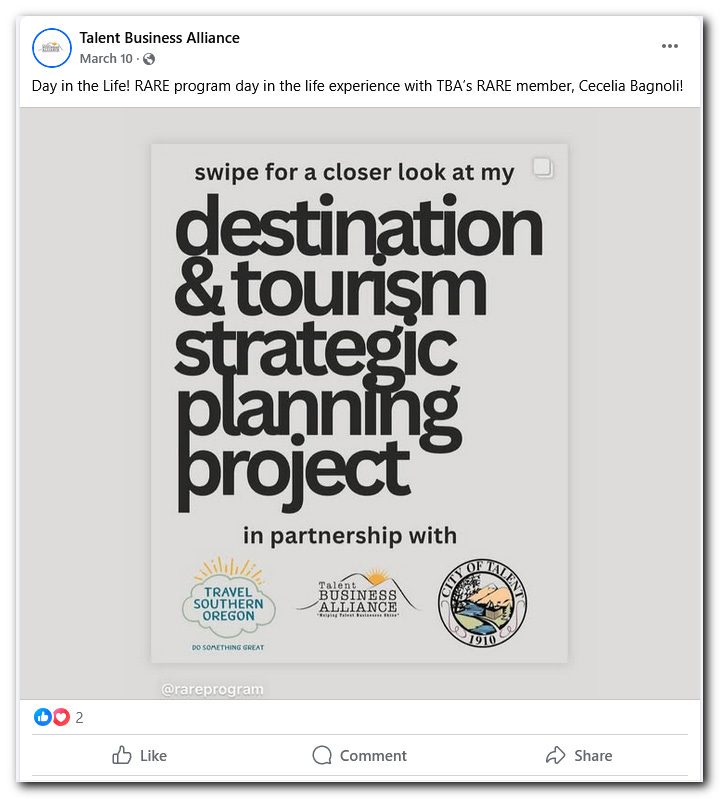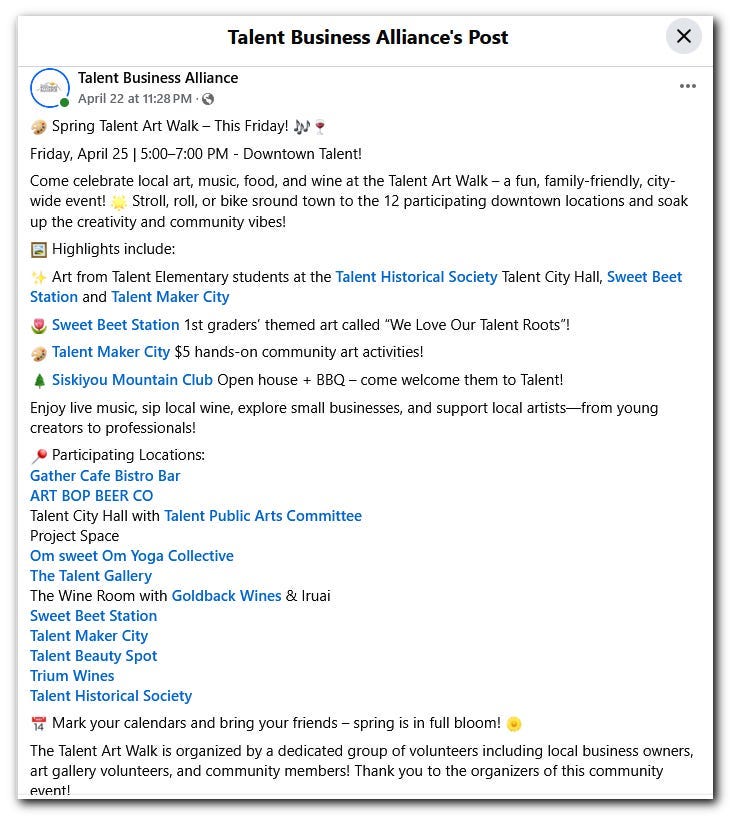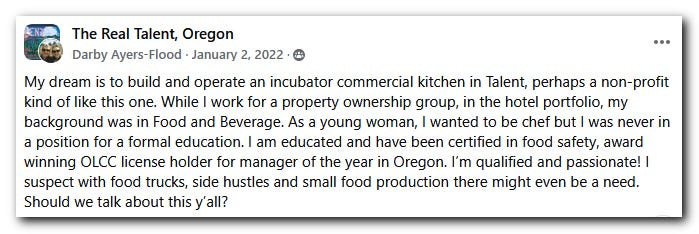TBA, City Hall, and Questions of Civic Integrity
Faded lines between public office and private interest may not be illegal, but public funds benefiting Talent's elected leaders does suggest ethical drift, small-town style.
Author’s Note: The Talent Business Alliance (TBA) has become an oddly sensitive topic of discussion in town, has it not? For one thing it’s kind of everywhere recently, having become involved in a bunch of prominent community projects: the Evening Markets, the Harvest Festival, Gateway development, the Art Walk. But there’s also a ton of confusion about its relationship to the City of Talent government, which makes sense given that it’s run by the Mayor and there are several murky connections between the two entities. People have a lot of questions about the relationship of TBA to elected officials, City staff, local businesses, and us normie taxpayers. But asking the questions feels very much frowned upon these days, as if wanting to discuss possible TBA conflicts is an attempt to divide and harm the community. That kind of rhetoric silences honest discussion and leaves us all out here guessing, trying to fill in the information gaps on our own - which is exactly the kind of vacuum where misinformation thrives.
Even the Mayor’s strongest supporters can’t deny that the public needs to better understand where TBA ends and City business begins. Since it seems unlikely they’ll be giving us a clear and complete breakdown of the many connections between the Talent Business Alliance and the City, or any official assurance that its relationship is entirely unproblematic and raises no ethics questions, we want to use this forum to examine TBA’s role within Talent’s political and business ecosystem ourselves. So if you have direct experience or insight into how TBA operates, whether financial, organizational, or political, that you think could help us lay out the issues for our readers, we encourage you to reach out to us. Your identity will be kept confidential.
Now, on to the first TCW Report dedicated entirely to everyone’s favorite AltChamber of Commerce.
Ethical Drift:
A gradual shift away from accepted ethical standards, often inadvertently, when informal practices and personal relationships start to replace the rules for public accountability and the boundaries between personal and public interest. This is commonly justified with ideas like “There’s no one else to do the work” and “This is how we can best help the community,” but over time, transparency, trust and accountability all suffer and public resources can end up serving personal agendas, all without anyone technically breaking the law.
Signs of ethical drift in a small town:
Public officials are also running nonprofits, businesses, or development projects that receive City support, but don’t withdraw from deliberations to avoid the appearance of impropriety.
Public money is allocated through informal conversations or administrative decisions without council votes, accessible documentation, or public awareness.
Updates are delayed, questions go unanswered, and public records and meeting minutes are missing, incomplete, or difficult to access.
Projects or funding priorities align closely with leaders’ personal ambitions, but there is no distinction made between the personal and the official.
The City Council serves as its own ethics and oversight committee.
When community members ask questions, they are labeled as divisive, or are accused of “making things political,” rather than their voices being heard. Ethical concerns from citizens are brushed aside as personal attacks and misinformation rather than legitimate calls for transparency.
And on that note, let’s talk about the TBA’s tourism intern.
Remember last July when the Mayor TBA Director was excited to tell us about how Talent was given the amazing opportunity to have a AmeriCorps RARE member come to town and do a bunch of cool stuff that would “enhance the town’s appeal and support local economic growth? She even paid for a full page ad on the back of the Talent News & Review to tell us about it.
Well, we have heard exactly nothing about this project since then, up until we were informed by KOBI on May 7th that the federal cuts to the AmeriCorps program would result in the loss of a TBA employee.
…RARE has four members in Southern Oregon working in roles from disaster preparedness to rural energy support that are being cut.
“This is not just Ashland. We have folks in the Talent Business Alliance losing an employee, the Greater Applegate is losing their Fire Resiliency Coordinator– which is such a crucial position for a small community. And there’s not going to be a corner of Oregon that doesn’t feel the loss of these people and these services,” said Embleton [an Ashland-based RARE member].
Most people reading that probably went “Wait, which TBA Employee? Oh yeah, there was a grad student doing something on tourism. Whatever happened with that whole thing?”
Good question. Hard to say. We do know now though, and only because one particularly sharp-penciled member of the TURA Budget Committee brought it up in a public meeting last week, that the City of Talent paid $11,000 to support TBA’s grad student. That means 41% of the Host Organization fee of $26,500 paid to AmeriCorps was publicly funded from the City’s coffers.
As far as what the student was able to accomplish in her time and what the funding cut meant for the project she was working on, that all remains unclear. We think it should be made very clear, given the City’s ample contribution to the project, but the convoluted web of relationships between City Hall and the TBA makes it difficult for the public to understand who is accountable for what, which tends to end up letting all of them off the hook.
So let’s do a mid-depth dive into the Mysterious Case of TBA’s Tourism & Destination Coordinator and ask some questions that maybe one of the people we elected to keep us informed can answer for us.
This RARE Opportunity
In July of 2024 the Talent Business Alliance applied as a Host Organization for the RARE (Resource Assistance for Rural Environments) program. From the UO website:
RARE AmeriCorps is an AmeriCorps program administered through the University of Oregon’s Institute for Policy Research and Engagement. The RARE AmeriCorps Program has been supported over the years by grants from AmeriCorps, The Ford Family Foundation, the University of Oregon, the Oregon Food Bank, the Federal Emergency Management Agency, the Oregon Department of Transportation, and other agencies. In addition, each participating host organization provides $26,500 of the approximately $52,000 needed to place, train, and support a full-time RARE AmeriCorps member.
The TBA is the only entity listed as a Participating Host Organization in their application for the program. The City of Talent and Travel Southern Oregon are included as organizations that the student would work with over the course of the assignment. If the TBA position lasted for its intended duration it would have been from September 2024 to August 2025. Executive Director Darby Ayers-Flood was designated on record as the student’s Supervisor.
What would that RARE student intern be doing? According to the application submitted by TBA:
60% of their time would be on developing a Destination Strategic Plan for Talent. They would identify & reach out to local wine, biking, art & culture, and culinary industry leaders and create a structure for relationships between groups. The teams would then serve as resources to develop the Strategic Plan, which would include an inventory of community destination assets that would lay out a path for future investments, development, and partnerships.
The remainder of their time would be allocated to:
- Develop a Project Outline for Wine Country Bike Trails that would work towards designating Wine Country Cycle Routes, and explore funding options.
-Serve as Talent’s Art District Vision Facilitator, connecting with partners to create an outline for the creation of a new cultural district.
Well, the closest we ever got to an update on this Amazing Opportunity to Revitalize our Economy was this post on TBA’s Facebook page in March, which was a photo of an Instagram reel on the RARE account. The TBA post didn’t include a link to the content. Just this photo and caption:
The RARE intern may have put significant effort into the Talent Art Walk that started in January 2025 and now happens quarterly, but we don’t know that for sure because any contribution she may have made to the event was never mentioned publicly.
The next thing we hear about the program is that it was DOGE’d. And we don’t even hear about it from TBA or City officials, but from a Medford news station quoting an Ashland RARE participant.
What does this funding cut mean for Talent? Did TBA’s Destination Coordinator position end immediately? Is she still working on her projects, and if so will she be here until the planned end of the assignment? If her job in Talent was already terminated and no more work will be completed, what will become of the Destination Strategic Plan? And what about all that wine country bike trail coordination? WHAT ABOUT WINE BIKING YOU GUYS?!?
Seriously, regardless of what anyone might think about the value of the work, it would be nice to know if anything was produced in her months working for TBA that can be picked up and followed through on by someone else, or is it all a loss? How much of a loss was it?
Given that the City of Talent paid for close to half of the cost of TBA’s intern it seems appropriate to let the public know the status of their projects and what will become of that work, if anything.
Following the Money
Ok we may not be talking about a ton of it here - $11k is a small fraction of the City’s budget to be sure - but hey it’s not nothing! It’s certainly an amount that could have been used in a thousand other ways to benefit people who live and work in Talent. Plus the mechanics of this arrangement, and the broader implications of it, are certainly worthy of public scrutiny.
According to the City Council meeting minutes from May - August 2024, the City paying a portion of the $26,500 RARE fee was neither voted on nor discussed publicly. This is unsurprising given that the City Manager now has the authority to spend up to $50,000 on something without approval from City Council, and expenditures like this wouldn’t necessarily even make it into the minutes of a meeting until budget season (as it just did in this case, actually).
Are you wondering how it could possibly be appropriate for the Mayor to enter into a financial agreement with her own City Manager, someone whose job security she significantly influences, that results in public funds being directed to a nonprofit she leads and draws a salary from? We’re wondering that too.
In Oregon, public officials are supposed to avoid actual and potential conflicts under ORS Chapter 244 of the Oregon Government Ethics Law. Even if Mayor doesn’t vote on a contract, signing one as a nonprofit representative while having power or influence over the City Manager also signing it may still create a conflict under:
ORS 244.120: Requires public officials to announce conflicts of interest and recuse themselves.
ORS 244.040: Prohibits the use of a public position for personal gain or to benefit a business with which the official is associated.
It is not standard practice, not even in a very small town, for a City to execute a contract with a nonprofit where the signatory is both the nonprofit Director and the Mayor of the City. It gives the impression that one person is signing for both sides even if that’s not the case. Better governance practices would be full disclosure to Council, an independent review by the City Attorney, and explicit documentation in the public record (and in a lot of cities would be outright prohibited). While Talent operates under a "strong council, weak mayor" system, the influence of the Mayor over the City Manager (especially when the Manager is interim or pro tem and hoping to make the position permanent) is still significant, particularly in small towns where social, political, and business networks overlap so much.
And this isn’t the first time this questionable arrangement has come up. It’s not even the first time in the last year.
In August 2024, City Manager Milliman signed a contract with Mayor TBA Director Ayers-Flood to pay her nonprofit up to $25,000 to take over coordinating the 2024 Talent Harvest Festival, which was previously managed by City staff. Because the amount of the contract was not over $25k, the City did not have to open the process to bidding and was able to just pay TBA to do it without Council approval or a request for proposals from other community event planners.
Fortunately, Mayor Darby knew an event planner she could hire to do the actual work, one who also happens to serve on the Talent City Council! $15,000 of the payment to TBA went to pay City Councilor Ana Byers to coordinate the Harvest Festival.
Just a few months ago Byers started her own event consulting business and highlights her management of the Talent Harvest Festival on her website. Congratulations to Councilor Byers on her new business venture.
If you’re keeping track, that’s two paid TBA employees, one paid TBA contractor, and one (now former) TBA Board Member (Ponomareff) currently serving on the Talent City Council.
Moving along, nothing to see here.
An agreement between the City and TBA for the City to contribute a portion of the RARE AmeriCorps fee is technically legal, but what is definitely not clear is how a financial agreement signed by a Mayor and her City Manager that would financially benefit the Mayor would not be considered at least an ethics violation. Plain common sense tells us it is wildly inappropriate at best.
How would this financially benefit the Mayor? More grant funding for TBA, for starters.
The PIER Proposal (Planning, Infrastructure, and Economic Revitalization Program)
In March 2025, TBA applied for a PIER grant for $500,000 to develop a program that would support economic revitalization for the hospitality/tourism and microenterprise industries in Talent and Phoenix. The majority of the funding - $305k - would be used to pay the salaries of its employees, which are of course Director Ayers-Flood and Administrative Coordinator (and City Council member) Colette Pare-Miller.
The work that will cost half a million dollars consists of:
A “Tourism Website”
Training for hospitality entrepreneurs
Support for microenterprise and a plan to launch a business incubator
Click to read TBA’s 2025 PIER application.
Ah yes, The Incubator. Surely you’ve heard of The Incubator. It was all over the Talent news wires last month because TBA held a forum to get more people involved in helping make the Mayor’s dream come true. Literally!
”My dream is to build and operate an incubator commercial kitchen in Talent, perhaps a non-profit kind of like this one. While I work for a property ownership group, in the hotel portfolio, my background was in Food and Beverage. As a young woman, I wanted to be chef but I was never in a position for a formal education. I am educated and have been certified in food safety, award winning OLCC license holder for manager of the year in Oregon. I’m qualified and passionate! I suspect with food trucks, side hustles and small food production there might even be a need. Should we talk about this y’all?”
-Mayor Darby, January 2, 2022

What does any of that have to do with the RARE intern?
The student’s project with TBA was mentioned in the grant application as a near-complete Strategic Plan that can be implemented if the $500,000 is awarded. It was explicitly called out in the main Project Summary of the application as a foundational document to guide the work of the proposed PIER-funded TBA economic revitalization team.
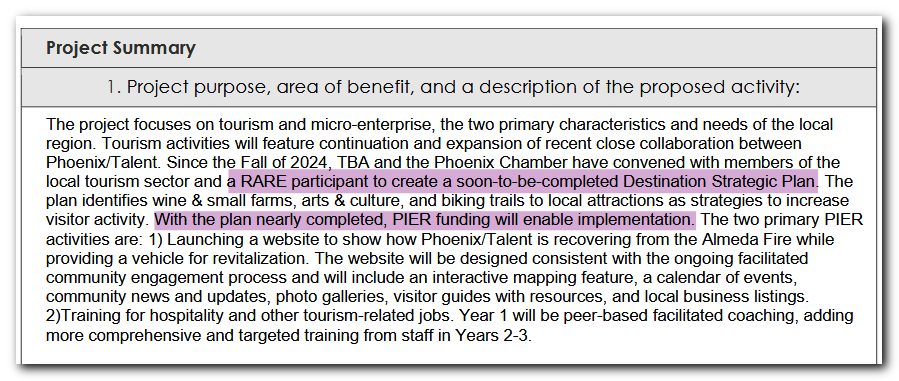
The Winery Biking Trails project included exploring funding sources as part of the job description, basically making the RARE deliverable for that project a grant application-ready document, complete with list of all the sources TBA could use it to get funding from.
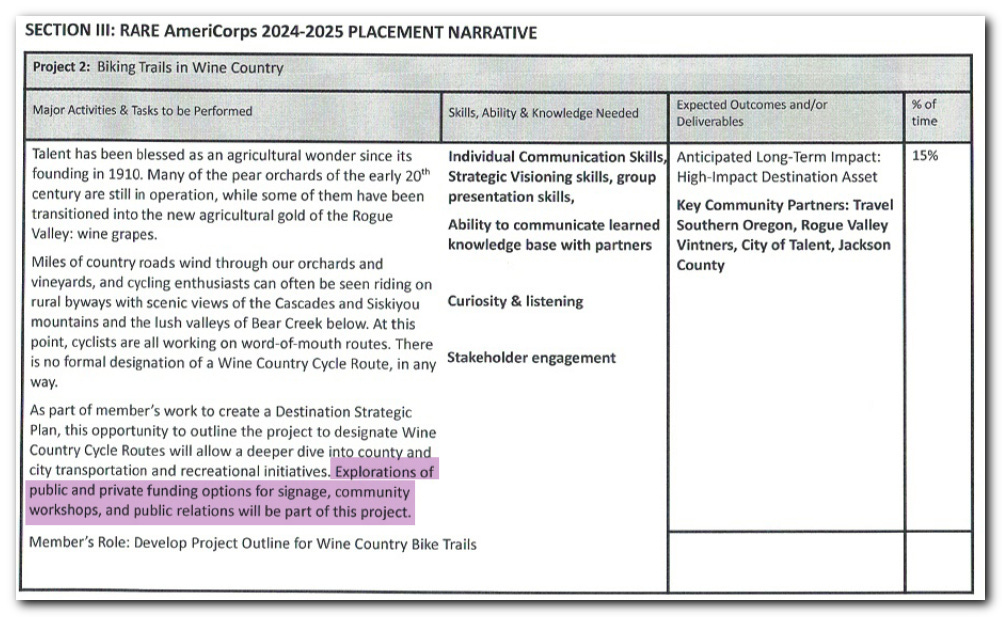
This is more speculative, but the RARE-produced Destination Strategic Plan was also very likely intended to be used in grant applications to other agencies for the matching funds to help launch The Incubator in Year 3 of the PIER grant.
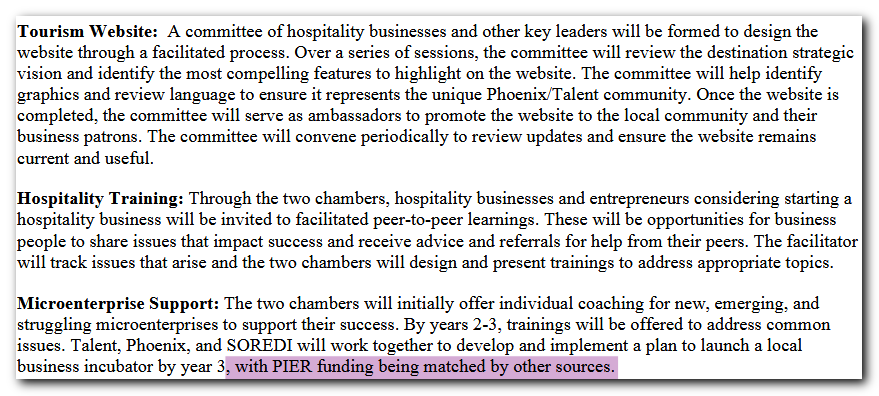
Given just what we can see for ourselves in these applications, it sure seems like the main pupose of the RARE intern position was to help get more grant funding for the Talent Business Alliance over the next several years.
Put another way, it looks like the City Manager used $11,000 of public funds to help produce reports that the Mayor’s own nonprofit could use to secure more grant money for itself. And a portion of the grant money her nonprofit would receive would go towards paying the Mayor a salary to literally create her own dream job.
It’s not too hard to see why the City-TBA relationship has raised more than a few red flags. And no this is not just “how these things work.” Or at least it shouldn’t be.
It also makes us wonder just how much public money is quietly being spent advancing personal and professional interests under the guise of disaster recovery and economic revitalization.
What Civic Integrity Looks Like
It’s long past time for the few non-TBA-affiliated members of City Council and the City Manager to step up and request an audit of the TBA’s interconnected relationships to ensure that public resources are not being used to establish or prioritize officials’ careers over programs that would benefit the people of Talent. Something needs to be done by City Council to stop the ethical drift happening in City Hall and get us back on the right track.
If I were an actual journalist and not an Anonymous Blogger with zero clout I’d ask the Mayor, City Council members, and City Manager these questions:
Please clarify the process by which City funds were allocated to support the RARE program employee of the Talent Business Alliance with an $11,000 contribution. Was a proposal submitted to the City from TBA that outlined the benefits to the public and the City? Who reviewed and approved the specific deliverables and outcomes tied to the $11,000? How was that figure landed on? At what point in the process of applying for the RARE program was this decision made? Was any third-party oversight involved?
What would you say to Talent residents who feel uncomfortable with the level of financial and leadership overlap between the City and TBA?
What steps are taken to ensure transparency and public accountability when City funds are used for projects tied to organizations that the Mayor or Council members lead or are compensated by?
Would you support an independent review of City-TBA financial interactions to help reassure the public that no ethical lines have been crossed, as well as a public-facing transparency report outlining all current financial and operational connections between the City and TBA?
Would you be open to establishing an independent ethics or oversight committee to review future partnerships involving City officials and nonprofits?
A transparent Talent government would not have necessitated this article or speculation because it would have already anticipated, and held itself accountable to, these types of questions and concerns from the public. That might have included an update on the RARE student’s work at any point, or an announcement that the position was unexpectedly cut short, or even assurances that there were no conflicts of interest in the financial contribution from the City.
In a transparently-governed community, the public wouldn’t have found out how much the City paid for the RARE student only because someone asked about a specific line item during a Budget Committee livestream. Instead we would have all known from the beginning exactly what level of support the City was providing and why that amount was needed in order to take advantage of the RARE student opportunity.
If transparency was genuinely a priority for Talent City Council, public input might have even been solicited before committing to the decision to participate. There are City leaders out there who make real efforts to consistently inform and involve their constituents in decision-making under the guiding principle that a cohesive, collaborative community is built through voluntarily transparent governing*. Imagine a Talent government that doesn't just comply with transparency laws (usually, barely) but truly embraces transparency practices as a foundation for public trust and a tool for citizen empowerment.
*This concept is one we’ve been thinking a lot about over here at the TCW Commentary Bureau offices. If you're a subscriber you can expect to hear more about civic integrity and voluntary transparency in Talent in the months to come. In the meantime, if you have thoughts on that topic or any information to share with us, please leave a comment or send an email to talentcouncilwatch@gmail.com.
And watch out for the drift.
-Talent Council Watch

